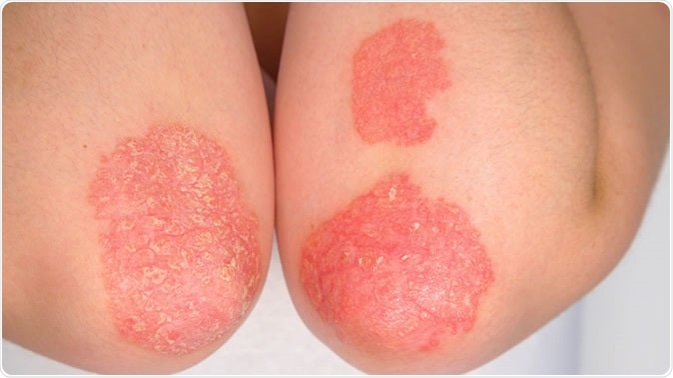Can Arthritis Affect Skin?
Skip to:
- What is arthritis?
- The severity and prevalence of arthritis related to age
- Psoriatic arthritis
- Rheumatoid nodules and vasculitis
Arthritis is a condition of joint inflammation. Several types of arthritis exist, with some involving the skin, immune system, and blood vessels.
What is arthritis?
Arthritis is a term used for inflammation of the joints, the tissues surrounding the joints, and other associated connective tissues. The symptoms of arthritis include joint pain, stiffness, redness, swelling, warmth, and decreased range of motion for the affected joints. These symptoms can heavily limit an individual's participation in certain types of labor and physical activities. The negative impact on everyday life as a consequence of arthritis may also result in impaired mental health for sufferers.

The severity and prevalence of arthritis related to age
A study performed in Canada aimed to compare the severity of arthritis in elderly patients (75+ years old) with younger adult patients (20-74 years of age). The younger adults were further split into three groups during the study (20-44 years, 45-64 years, 65-74 years). This study used two surveys (the 2008 Canadian community health survey [CCHS], followed by the 2009 survey on living with chronic disease in Canada [SLCDC]) to gain new information relating to the experiences of Canadian patients with arthritis, in particular, how they managed their condition.
Approximately 4,500 patients participated in this study, which assessed their joint pain, fatigue, sleep limitations, stress, general health, and mental health. The results showed that the majority of participants were female, young adults, overweight/obese, and had pain in 4 or more joints.
Additionally, the youngest group (20-44 years) expressed more frequent and severe fatigue compared to the elderly group, however, poorer general health was endorsed more frequently in the elderly group. High levels of stress and poorer mental health were seen in younger and middle-aged (45-54 years) adults compared to the elderly (75+ years) patients.
Ultimately, this study concluded that, despite the common expectation for the elderly to have more severe arthritis symptoms, that they are less likely to report worse symptoms. These findings show that both younger and older patients with arthritis can experience significant health-related quality of life impairments.
Psoriatic arthritis
There are numerous skin manifestations related to the various forms of arthritis. Psoriatic arthritis involves psoriatic plaques, whereas rheumatoid nodules develop under the skin in patients with rheumatoid arthritis.

Psoriatic arthritis is a chronic inflammatory disease that results in psoriatic skin lesions and joint inflammation. Psoriatic arthritis is most common in white persons.. The direct cause of psoriatic arthritis is still unknown; however, it is believed that genetic, environmental, and immunological factors contribute to the susceptibility and development of the disease.
It has been shown that superoxide products are increased in patients with arthritis. Increased superoxide production in leukocytes and dermal fibroblasts occurs in psoriatic arthritis. Superoxide dismutase (SOD) is an antioxidant that decreases the level of superoxide radicals by aiding in their transformation into less toxic compounds. Manganese SOD (MnSOD) scavenges oxygen free radicals to protect from superoxide anion damage. A polymorphism of MnSOD (118C/T) has been shown to be more common among patients with psoriatic arthritis compared with healthy controls. The study established that MnSOD 1138C polymorphisms may be a factor in the development of psoriatic arthritis; therefore, more research on this gene may provide further insight into psoriatic arthritis development and potential treatments.
Rheumatoid nodules and vasculitis
Rheumatoid arthritis is an autoimmune form of arthritis that results in systemic inflammation of joints and associated tissues. Rheumatoid arthritis can affect other organs and tissues at extra-articular sites including tendons, ligaments, lungs, the gastrointestinal (GI) tract, cardiovascular system, and the skin. The extra-articular sites are affected due to rheumatoid nodules, which are 0.2 to 5 cm lesions of fibrinoid necrotic tissue surrounded by palisading histiocytes (phagocytotic cells present in connective tissues).
Rheumatoid vasculitis is extremely rare but is the most serious extra-articular complication that can arise from rheumatoid arthritis. Rheumatoid vasculitis is the inflammation of blood vessels that can affect small to medium-sized vessels of any organ; thus, disease expression is extremely heterogeneous. The skin and peripheral nervous system are the most commonly affected areas. This causes the formation of skin rashes and ulcers as well as the loss of sensation due to nerve damage. Other organ systems – the lungs, GI tract, kidneys, and the central nervous system – are less affected by rheumatoid vasculitis but have more problematic consequences when affected.
References
- O’Donnell, S., et al. (2015). Arthritis has an impact on the daily lives of Canadians young and old: results from a population-based survey. BMC Musculoskeletal Disorders.https://dx.doi.org/10.1186%2Fs12891-015-0691-2
- Yen, J., et al. (2004). Manganese Superoxide Dismutase Gene Polymorphisms in Psoriatic Arthritis. Disease Markers.https://dx.doi.org/10.1155%2F2004%2F734242
- Wenink, M., et al. (2011). Macrophage dysfunction in Psoriatic Arthritis. Journal of Translational Medicine. https://dx.doi.org/10.1186%2F1479-5876-9-S2-P59
- Sivridis, E., et al. (2019). Rheumatoid nodules in thyroid gland parenchyma as an expression of rheumatoid arthritis: a case report. Journal of Medical Case Reports. https://dx.doi.org/10.1186%2Fs13256-019-2113-9
- Lee, J., Kim, I., Cho, M. and Lee, J. (2017). A Case of Rheumatoid Vasculitis Involving Hepatic Artery in Early Rheumatoid Arthritis. Journal of Korean Medical Science. https://dx.doi.org/10.3346%2Fjkms.2017.32.7.1207
Further Reading
- All Arthritis Content
- What is Arthritis?
- Types of Arthritis
- Arthritis Treatment
- Arthritis History
Last Updated: Oct 17, 2019
Written by
Samuel Mckenzie
Sam graduated from the University of Manchester with a B.Sc. (Hons) in Biomedical Sciences. He has experience in a wide range of life science topics, including; Biochemistry, Molecular Biology, Anatomy and Physiology, Developmental Biology, Cell Biology, Immunology, Neurology and Genetics.
Source: Read Full Article



